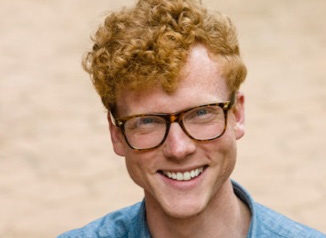For many PhD students, working as a teaching assistant (TA) is not so much a calling as something that comes with the territory — essentially a requirement that allows them to earn some money while developing new skills. But for Levi Miller (MEd 2017, MS 2014), teaching turned out to be the passion that led him off the PhD track and into the high school classroom. Now Miller, who will teach this year at the highly regarded Engineering Academy at Dos Pueblos High School, has received one of six Knowles Teacher Initiative (KTI) Fellowships for 2017, which are given to promising math and science teachers across the nation who are beginning their teaching careers.
After earning his bachelor’s degree in engineering physics from the Colorado School of Mines, Miller began a PhD program in the UCSB Materials Department, with professor (and current department chair) Michael Chabinyc as his advisor. Miller had been a TA at the Colorado School of Mines, and was involved with the Center for Science and Engineering Partnerships at the California NanoSystems Institute while at UCSB, volunteering for its Family Ultimate Science Exploration nights and teaching a course through the center’s School for Scientific Thought.
Miller found that the more he taught, the more he was attracted to it, and after a year as a doctoral student, he recalls, “I realized that I enjoyed the functions of teaching I was doing as a TA more than I enjoyed research.”
That led him to make the difficult decision of leaving the PhD program to pursue a Master of Science in materials and then a Master of Education at UCSB’s Gevirtz Graduate School of Education. “Making the switch was one of hardest things I’ve ever done, because the Materials Department was so good — and so good to me,” Miller recalls. “Michael Chabinyc was a kind and supportive advisor,” and one who fully supported Miller’s career decision. “I was able to have that conversation without burning any bridges. I really appreciated that, because it didn’t have to be that easy.”
“Levi was clearly an outstanding scientist and was already co-authoring papers in his first year of graduate school,” Chabinyc recalls. “He came to me after some very serious thinking about his future and felt that he wanted to find a pathway in education. As a mentor, my job is to enable students to excel and expand their capabilities. Levi had a vision, and it was just a matter of giving him the support he needed to make that happen. His enthusiasm for science and education are inspiring. It’s fantastic to see that he will be working at Dos Pueblos.”
Looking back, Miller says, he took only positives from his time as a PhD student. “Doing research in the Chabinyc group was a great experience for teaching at the public school level, and one that not many teachers have. My time there was really valuable and informs my teaching now.”
Teaching is a tough profession, with long hours and, often, inadequate pay, support, and resources. It can be especially hard for new teachers, who may have to relocate for their first job and need arrive in time to find a place to live, familiarize themselves with their surroundings, set up their classrooms, and otherwise prepare for the year ahead. But they don’t get paid until after school starts. That’s a huge hardship. Further, they are often handed a schedule and the keys to the classroom and then set off on their own with the expectation to do great things. The isolation and resulting stress can lead to burnout and the widely recognized syndrome of young teachers’ leaving the profession after five years.
As the signature program of the Knowles Teaching Institute, the KTI is intended to make it easier for promising young teachers to thrive in their new careers while improving education in science, technology, engineering, and math (STEM) in the U.S.
“The fellowship makes you as a starting teacher feel respected and cared for and allows you to get the resources you need to give students memorable experiences,” Miller says. “I credit the program for bringing in the people from everywhere: rural Wisconsin, downtown Oakland — every type of school in the U.S. They support innovation and treat you like royalty for five years so that when you complete the fellowship, you want to continue teaching.
“They’re trying to graduate you from being a cog in the educational machine and just keeping your head above water to developing you as a teacher who is not afraid to take initiative and can serve as a vector for positive systemic change within your district. It’s inspiring.”
The comprehensive five-year program supports early-career high school mathematics and science teachers in their efforts to develop teaching expertise and to lead from the classroom. Fellows have access to grants for purchasing classroom materials, engaging in professional development, and spearheading leadership activities that have an impact beyond their own classrooms. They also receive stipends, as well as mentoring and coaching from experienced teachers and teacher educators, and membership in a nationwide community of more than three hundred teachers who are committed to improving education. The total package ends up being about $8,000 per year plus complimentary travel accommodations for meetings.
While the Dos Pueblos Engineering Academy tends to attract high-achieving students, Miller says “I don’t think about students’ achievement level all that much. I like teaching in public school because I enjoy teaching the whole person instead of just the subject. As much I love physics and materials, I love teaching because of the relationships you build with students and the role you play for each other in growing and finding out about life.

Following his passion for teaching led Levi MIller from a PhD track at UCSB to a high school classroom in Goleta.
